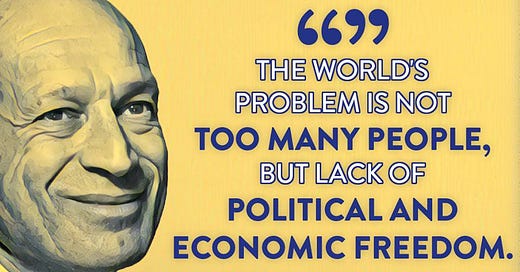Final Reply to Ridley
Matt Ridley once again graciously responds in the comments. Our differences appear to have largely evaporated. Ridley’s in blockquotes, I’m not.
But your challenge mistakes my argument. I have not argued that there is no positive correlation of innovation with population, only that, as population size increases, population size alone will become a diminishing influence compared with population interconnectedness. You are trying to push me into a rhetorical box I don’t wish to occupy: that at some level population growth stops helping innovation or starts harming it. That may be a case somebody wants to make — but it’s not the case I’ve argued.
Several of your statements seem hard to interpret any other way, especially: “As for small countries leading the world, I would argue it is almost the rule,” and “To have 10,000 people is a lot better than to have 5,000. But to have a billion instead of 500m? I’m not convinced.” Still, if you agree that population is good for innovation, I’m satisfied.
Instead I have argued that bigger populations will always be more innovative, of course. But once populations are large the most effective way to make them more innovative is not so much to make them larger as to make them more interconnected.
Sure, as a matter of policy, it’s far easier to remove barriers to communication and trade than to increase the number of humans on earth. But that doesn’t mean that interconnection is “more important” than population, just more policy-sensitive.
A genetic analogy might help. Bigger genomes get more mutations. But genomes that exchange genes more often — i.e., have shorter generation times — innovate more, because they throw up more combinations of sequences.
A fine analogy, I’m happy to accept it. 🙂
The post appeared first on Econlib.




